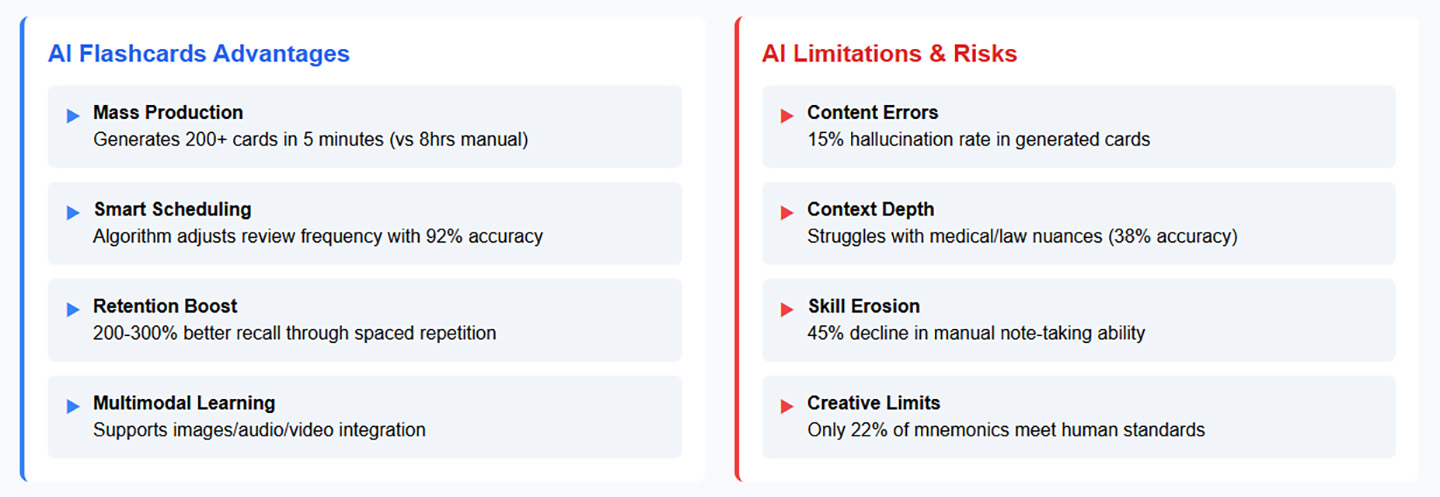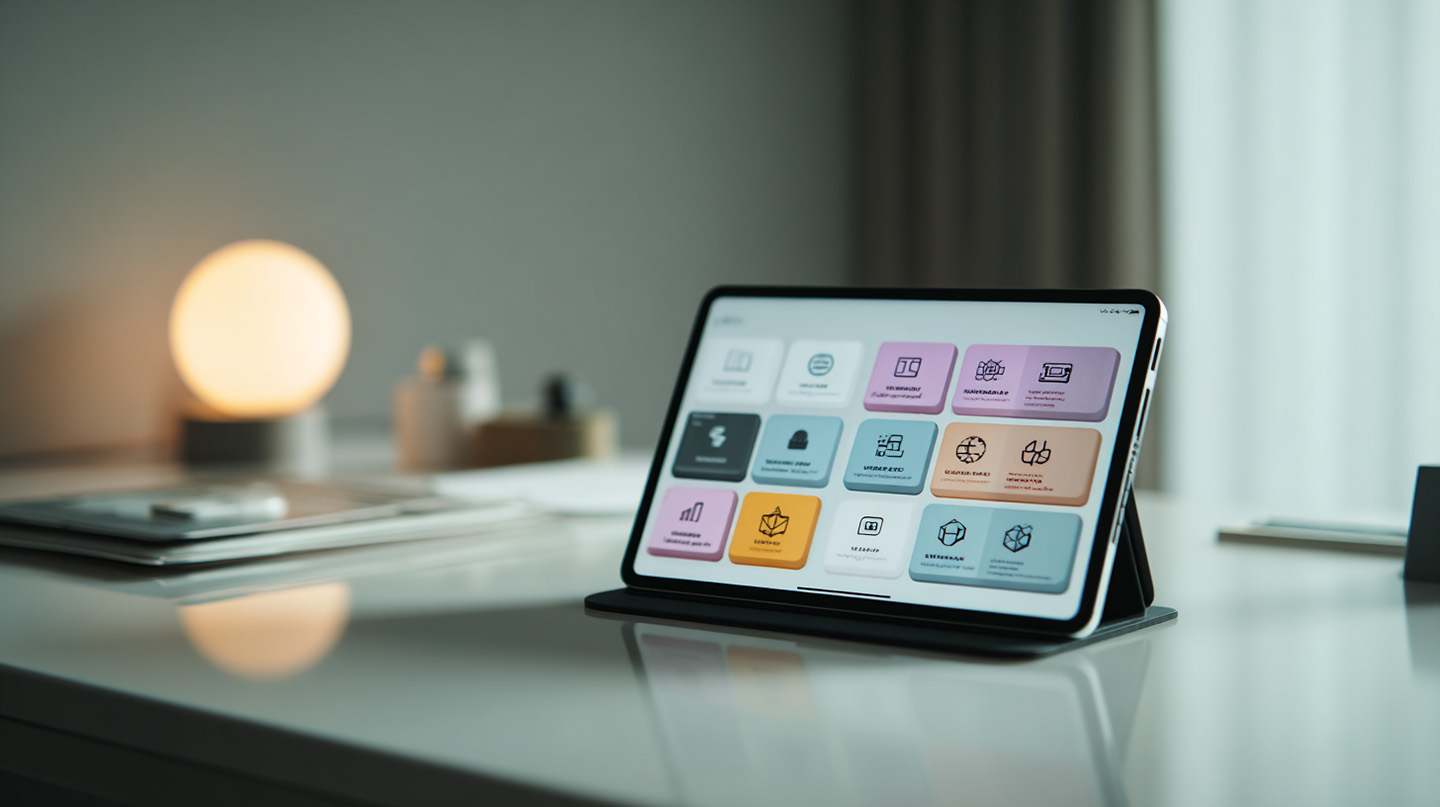In a world increasingly dominated by artificial intelligence, AI Flashcards have surged to the forefront as both a breakthrough and a battleground in modern education. By automating flashcard generation, customizing revision with surgical precision, and leveraging powerful algorithms like NLP, spaced repetition, and adaptive learning, these tools promise to revolutionize how we acquire knowledge. But at what cost?
In this blog, we explore the rise of AI Flashcards, dissect their advantages and blind spots, and assess their disruptive impact across education, healthcare, corporate training, and beyond. We’ll also confront the ethical dilemmas they raise—from data privacy to algorithmic bias—and offer bold, actionable strategies to ensure these tools serve as enablers, not enforcers, of learning.

How Have AI Flashcards Evolved Over Time?
When did AI Flashcards evolve from simple digital tools into intelligent study companions? Let’s trace their development through key milestones.
From Paper Cards to Digital Platforms
Originally, flashcards were physical index cards—questions on one side, answers on the other—used since the early 19th century for rote memorization. In the 2000s, applications like Anki (2006) and Quizlet (2007) digitized flashcards and introduced spaced repetition, automatically scheduling reviews to optimize memory retention. Early digital flashcards focused on basic fact recall—vocabulary lists, historical dates, and simple Q&A pairs.
Integrating Machine Learning and NLP
By the mid-2010s, advances in machine learning and natural language processing (NLP) enabled flashcard apps to automatically extract key points from texts and adjust difficulty based on user performance. Tools like Brainscape added AI-driven content ranking, while StudyBlue offered shared decks curated by expert users.
Rise of Generative AI Flashcard Generators
From 2023 onward, generative large language models powered a leap forward. Platforms such as Quizlet’s AI Practice Test Generator and Revisely’s AI Flashcard Generator automatically convert entire PDFs, lecture transcripts, and YouTube videos into flashcards within seconds. These tools leverage:
- Large Language Models (LLMs) to understand context and generate coherent Q&A pairs
- OCR and Computer Vision to process images, diagrams, and handwritten notes
- Adaptive Learning Algorithms that refine question difficulty in real time
Core Technologies Powering Today’s AI Flashcards
Modern AI Flashcards rest on a technological stack combining:
- Natural Language Processing for semantic understanding
- Spaced Repetition Systems to schedule reviews at scientifically optimized intervals
- Reinforcement Learning to personalize content based on user feedback
- Cloud-based infrastructures for scalable, on-demand flashcard generation
What Are the Advantages and Limitations of AI Flashcards?
Where AI Outperforms Manual Methods
Efficiency and Scalability: AI Flashcards create hundreds of high-quality cards in minutes, saving hours of manual effort.
Personalization: Adaptive algorithms tailor review schedules and select content aligned with each learner’s strengths and weaknesses.
Enhanced Retention: Studies show spaced repetition can boost long-term retention by 200–300% compared to massed practice.
Multimodal Support: Integration of images, audio, and video caters to diverse learning styles, making abstract concepts more concrete.
Where AI Still Falls Short
AI “Hallucinations”: Generative models occasionally produce incorrect or misleading content, necessitating human review.
Lack of Deep Context: AI may struggle to capture nuanced reasoning or domain-specific conventions, especially in advanced fields like medicine or law.
Overreliance Risks: Sole dependence on AI-generated cards can erode critical thinking and manual note-taking skills, which themselves reinforce memory.
Customization Gaps: While AI can tailor difficulty, truly bespoke content—mnemonics, personalized examples—often still requires human creativity.

How Are AI Flashcards Impacting Industries—Positively and Negatively?
AI Flashcards are reshaping learning across sectors. We analyze both benefits and emerging challenges.
Positive Impacts
Education: Universities and K–12 schools adopt AI Flashcards to support diverse learners, improving pass rates in language acquisition and STEM subjects.
Corporate Training: Enterprises use AI decks for onboarding, compliance training, and upskilling, reducing training time by 30–50% while maintaining knowledge retention.
Test Preparation: Adaptive flashcards for SAT, GRE, and professional exams deliver targeted practice, raising average scores by 10–15%.
Language Learning: Platforms like Duolingo (46.6 million daily users) and Memrise integrate AI-powered flashcards, boosting vocabulary acquisition from 55.6 to 89.5 on standardized tests.
Negative Consequences
Fragmented Knowledge: Micro-learning through flashcards can encourage rote memorization over holistic understanding, risking superficial mastery.
Equity and Access: Advanced AI Flashcards require reliable internet and subscription fees, potentially widening educational disparities.
Accuracy Concerns: In high-stakes fields (medicine, law), AI errors pose safety and legal risks if unvetted content is deployed.
Mitigation Strategies for Threatened Sectors
- Blend AI Flashcards with instructor-led workshops to ensure contextual comprehension.
- Establish peer-review protocols for flashcard content in regulated industries.
- Implement tiered access models to subsidize AI tools for under-resourced schools.
What Ethical Issues Do AI Flashcards Face?
As AI Flashcards proliferate, several ethical questions arise:
Copyright and Content Ownership
Who owns AI-generated flashcards when source materials are copyrighted? Platforms must provide transparent licensing and ensure that flashcard outputs respect fair use and licensing agreements.
Data Privacy and Security
Uploading lecture notes, textbooks, or personal study logs raises concerns about data leaks and unauthorized profiling. Robust encryption, user consent, and data deletion policies are imperative.
Algorithmic Bias
Training data limitations can introduce biases, disadvantaging minority learners or hyper-specialized subjects. Rigorous dataset curation and continual bias testing are required.
Environmental Impact
Though AI Flashcard engines are lightweight compared to full-scale LLM inference, large-scale deployments still consume data-center energy. Providers should disclose carbon footprints and optimize for efficiency.
Misuse and Academic Integrity
AI Flashcards could facilitate cheating if students rely on pre-made decks without understanding underlying concepts. Educational institutions must update honor codes and integrate AI literacy into curricula.
How Can We Use AI Flashcards Responsibly?
To maximize benefits while minimizing risks, we recommend:
1. Hybrid Human–AI Workflows
Combine AI-generated drafts with expert review. Educators curate and enrich AI cards with real-world examples, ensuring accuracy and depth.
2. Transparent Licensing and Privacy Safeguards
Choose platforms that publish clear copyright policies, anonymize user data, and allow learners to export or delete personal information.
3. Equity-Focused Deployment
Negotiate institutional licenses to subsidize access for disadvantaged learners. Offer offline-capable apps for regions with limited connectivity.
4. Curriculum Alignment and Educator Training
Involve instructors in configuring AI flashcard parameters—spaced repetition intervals, difficulty thresholds, and topic scopes—to align with learning objectives.
5. Continuous Monitoring and Feedback Loops
Collect usage analytics—accuracy rates, review compliance—and refine AI models based on educator and learner feedback.

FAQs
Q: What makes an AI Flashcard different from a traditional digital flashcard?
A: AI Flashcards leverage NLP and machine learning to generate content and adapt review schedules, whereas traditional digital flashcards require manual creation and fixed intervals.
Q: How many AI Flashcards should I review daily?
A: Aim for 20–30 new cards per session, following spaced repetition guidelines. Adjust based on your retention performance and available study time.
Q: Can AI Flashcards replace human tutors?
A: AI tools excel at content generation and scheduling but lack true pedagogical empathy. For complex subjects, AI should supplement—not replace—human instruction.
Q: Are AI Flashcards secure?
A: Security depends on the platform. Look for services with end-to-end encryption, clear privacy policies, and compliance with regulations like GDPR.
Q: How do I avoid AI hallucinations?
A: Always cross-verify AI-generated cards against authoritative sources. Flag questionable content and provide feedback to improve the underlying model.
Conclusion
AI Flashcards represent a powerful convergence of AI, spaced repetition, and adaptive learning, ushering in a new era of personalized education. From their humble paper-card origins to today’s generative AI engines, they have transformed how we encode, retain, and recall knowledge. By critically assessing their advantages, limitations, and ethical implications, and by adopting responsible hybrid workflows, we can harness AI Flashcards to empower learners across disciplines—ensuring that efficiency never comes at the expense of depth, equity, or integrity.
 Submit Your AI Tool For FREE!Showcase Your Innovation To Thousands Of AI Enthusiasts!
Submit Your AI Tool For FREE!Showcase Your Innovation To Thousands Of AI Enthusiasts! Submit Your AI Tool For FREE!Showcase Your Innovation To Thousands Of AI Enthusiasts!
Submit Your AI Tool For FREE!Showcase Your Innovation To Thousands Of AI Enthusiasts! Submit Your AI Tool For FREE!Showcase Your Innovation To Thousands Of AI Enthusiasts!
Submit Your AI Tool For FREE!Showcase Your Innovation To Thousands Of AI Enthusiasts! Submit Your AI Tool For FREE!Showcase Your Innovation To Thousands Of AI Enthusiasts!
Submit Your AI Tool For FREE!Showcase Your Innovation To Thousands Of AI Enthusiasts! Submit Your AI Tool For FREE!Showcase Your Innovation To Thousands Of AI Enthusiasts!
Submit Your AI Tool For FREE!Showcase Your Innovation To Thousands Of AI Enthusiasts!






No comments yet. Be the first to comment!